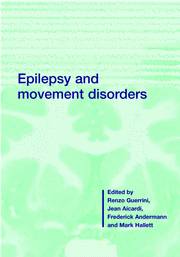Book contents
- Frontmatter
- Contents
- List of contributors
- Preface and overview
- 1 Epilepsies as channelopathies
- 2 Epilepsy and movement disorders in the GABAA receptor β3 subunit knockout mouse: model of Angelman syndrome
- 3 Genetic reflex epilepsy from chicken to man: relations between genetic reflex epilepsy and movement disorders
- 4 Functional MRI of the motor cortex
- 5 Neuromagnetic methods and transcranial magnetic stimulation for testing sensorimotor cortex excitability
- 6 Motor dysfunction resulting from epileptic activity involving the sensorimotor cortex
- 7 Nocturnal frontal lobe epilepsy
- 8 Motor cortex hyperexcitability in dystonia
- 9 The paroxysmal dyskinesias
- 10 Normal startle and startle-induced epileptic seizures
- 11 Hyperekplexia: genetics and culture-bound stimulus-induced disorders
- 12 Myoclonus and epilepsy
- 13 The spectrum of epilepsy and movement disorders in EPC
- 14 Seizures, myoclonus and cerebellar dysfunction in progressive myoclonus epilepsies
- 15 Opercular epilepsies with oromotor dysfunction
- 16 Facial seizures associated with brainstem and cerebellar lesions
- 17 Neonatal movement disorders: epileptic or non-epileptic
- 18 Epileptic and non-epileptic periodic motor phenomena in children with encephalopathy
- 19 Epileptic stereotypies in children
- 20 Non-epileptic paroxysmal eye movements
- 21 Shuddering and benign myoclonus of early infancy
- 22 Epilepsy and cerebral palsy
- 23 Sydenham chorea
- 24 Alternating hemiplegia of childhood
- 25 Motor attacks in Sturge–Weber syndrome
- 26 Syndromes with epilepsy and paroxysmal dyskinesia
- 27 Epilepsy genes: the search grows longer
- 28 Genetics of the overlap between epilepsy and movement disorders
- 29 Seizures and movement disorders precipitated by drugs
- 30 Steroid responsive motor disorders associated with epilepsy
- 31 Drugs for epilepsy and movement disorders
- Index
- Plate section
14 - Seizures, myoclonus and cerebellar dysfunction in progressive myoclonus epilepsies
Published online by Cambridge University Press: 03 May 2010
- Frontmatter
- Contents
- List of contributors
- Preface and overview
- 1 Epilepsies as channelopathies
- 2 Epilepsy and movement disorders in the GABAA receptor β3 subunit knockout mouse: model of Angelman syndrome
- 3 Genetic reflex epilepsy from chicken to man: relations between genetic reflex epilepsy and movement disorders
- 4 Functional MRI of the motor cortex
- 5 Neuromagnetic methods and transcranial magnetic stimulation for testing sensorimotor cortex excitability
- 6 Motor dysfunction resulting from epileptic activity involving the sensorimotor cortex
- 7 Nocturnal frontal lobe epilepsy
- 8 Motor cortex hyperexcitability in dystonia
- 9 The paroxysmal dyskinesias
- 10 Normal startle and startle-induced epileptic seizures
- 11 Hyperekplexia: genetics and culture-bound stimulus-induced disorders
- 12 Myoclonus and epilepsy
- 13 The spectrum of epilepsy and movement disorders in EPC
- 14 Seizures, myoclonus and cerebellar dysfunction in progressive myoclonus epilepsies
- 15 Opercular epilepsies with oromotor dysfunction
- 16 Facial seizures associated with brainstem and cerebellar lesions
- 17 Neonatal movement disorders: epileptic or non-epileptic
- 18 Epileptic and non-epileptic periodic motor phenomena in children with encephalopathy
- 19 Epileptic stereotypies in children
- 20 Non-epileptic paroxysmal eye movements
- 21 Shuddering and benign myoclonus of early infancy
- 22 Epilepsy and cerebral palsy
- 23 Sydenham chorea
- 24 Alternating hemiplegia of childhood
- 25 Motor attacks in Sturge–Weber syndrome
- 26 Syndromes with epilepsy and paroxysmal dyskinesia
- 27 Epilepsy genes: the search grows longer
- 28 Genetics of the overlap between epilepsy and movement disorders
- 29 Seizures and movement disorders precipitated by drugs
- 30 Steroid responsive motor disorders associated with epilepsy
- 31 Drugs for epilepsy and movement disorders
- Index
- Plate section
Summary
Introduction
Progressive myoclonus epilepsies (PMEs) are a heterogeneous group of rare genetic disorders sharing a common clinical picture: myoclonus, epileptic seizures and signs of neurological deterioration, particularly dementia and ataxia (Marseille Consensus Group, 1990). The causes of the PME syndrome are many; most of them, however, can now be accurately diagnosed in life due to recent advances in pathology, biochemistry and molecular genetics (Berkovic et al., 1986; Roger et al., 1992). In particular, molecular genetics has most dramatically increased our knowledge of the basic mechanisms involved in the PMEs (Serratosa et al., 1999a). In order to establish a precise diagnosis, knowledge of the biochemical and molecular genetic bases of the PMEs must now complement experience in identifying the clinical, neuropathological, and neurophysiological characteristics of each PME.
Aside from the problems of diagnosis, there are still some unresolved issues concerning the neurophysiology and pathophysiology of some clinical features, like myoclonus, which contribute in different ways to the movement disorder and disability associated with the PME syndrome (Commission on Pediatric Epilepsy of the ILAE, 1997).
In this chapter we will outline the main specific disorders causing PME, along with the recent advances of molecular genetics contributing to the nosology and knowledge of these conditions. Finally, we will also address the issues of the clinical and neurophysiological aspects of PMEs, with special reference to three outstanding features of the syndrome: seizures, myoclonus and cerebellar dysfunction.
Specific disorders causing PME
Despite a large number of rare conditions that may present with a PME syndrome, five principal causes are responsible for most cases of PME worldwide: Unverricht–Lundborg disease, Lafora disease, mitochondrial encephalomyopathies, neuronal ceroidlipofuscinoses and sialidosis.
- Type
- Chapter
- Information
- Epilepsy and Movement Disorders , pp. 227 - 250Publisher: Cambridge University PressPrint publication year: 2001
- 1
- Cited by



